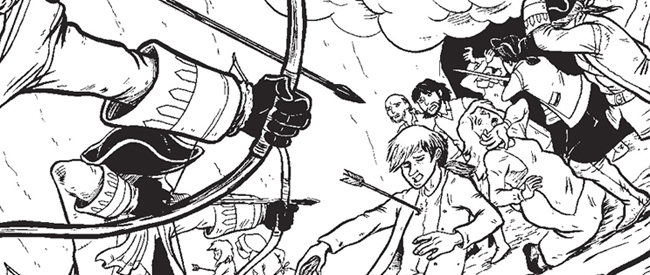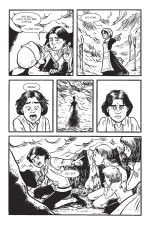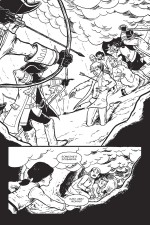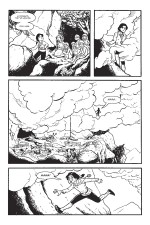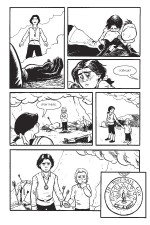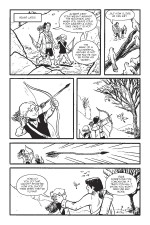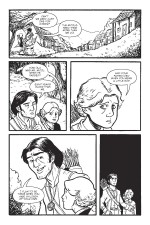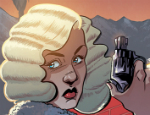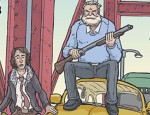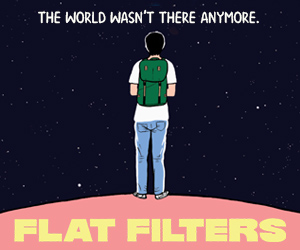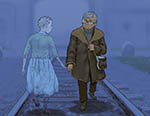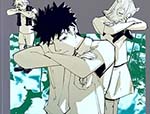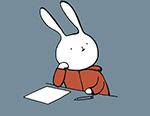Writing team Christos and Ruth Gage uncover a forgotten corner of world history, infusing Joshua Janavel’s struggle for religious freedom in 17th-century Italy with fiery passion and righteous zeal. Their artistic collaborator, talented newcomer Jackie Lewis, grounds the story in clean, solid linework that still manages to capture the heightened emotions demanded by the script.
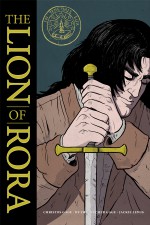 The idea that people should be allowed to practice whatever faith they want is something many of us take for granted in the developed world. So long as we aren’t hurting each other or engaged in some kind of criminal activity, most of us are allowed to believe in whatever we want – no matter how strange, far-fetched, or – in some cases – obsolete our beliefs may be.
The idea that people should be allowed to practice whatever faith they want is something many of us take for granted in the developed world. So long as we aren’t hurting each other or engaged in some kind of criminal activity, most of us are allowed to believe in whatever we want – no matter how strange, far-fetched, or – in some cases – obsolete our beliefs may be.
Still, in many nations and cultures around the world, people are persecuted on the basis of their religious affiliations. The separation of church and state, as a sociopolitical ideology, is – at least theoretically – one of the foundational constants of most Western democracies.
While some of the more cynical among us may dismiss this necessary separation of spiritual and secular beliefs as nothing more than an empty conceit designed to allay the fears of the voting public, there are many religious groups for whom the debate itself is a luxury.
It is into these deep politically charged philosophical waters that writers Christos and Ruth Fletcher Gage plunge in their depiction of Waldensian persecution in 17th-century Italy. A Protestant Christian religious group emerging in Lyon in the 12th century, the Waldensians had retreated to Piedmont in the Swiss/Italian Alps by the time depicted in The Lion of Rora, forced into the unforgiving mountains by the Catholic Duke of Savoy.
Savoy, under pressure from the French king to strengthen his lands and his resolve against the so-called religious insurgents, instigated the wholesale slaughter of Waldensian men, women, and children in a massacre that would afterwards be called the Piedmont Easter. Despite appeasing his king, Savoy’s actions would beget two important repercussions.
The sheer brutality of the Piedmont Easter shocked the rest of Europe, which was in the midst of religious reformation, and gained the Waldensians many strong political allies and the sympathies of Protestants across the continent – including Oliver Cromwell in England. This put Savoy’s king, who needed Cromwell’s navy in his campaign against Spain, in a particularly precarious political position.
The massacre also gave rise to the revolutionary Joshua Janavel – the so-called “Lion of Rora” – a peace-loving farmer who would go on to become one of the greatest military minds in history, after witnessing the atrocities visited upon his people. Using the Waldensians’ superior knowledge of the rugged alpine terrain and sheer animal cunning, Janavel succeeded in leading them to several victories over their oppressors.
More than simply a brilliant military commander, Janavel was reputedly a captivating leader, with the ability to draw and motivate and then organize an effective (and deadly) guerilla war against superior arms and numbers. As the book’s description notes, this is a story we’ve all seen before – a classic David-versus-Goliath tale reminiscent of Braveheart or 300.
That is Joshua Janavel’s story in a highly condensed, very small nutshell. It’s an oft forgotten story, but an integral part of our shared history. The Gages understand and celebrate this fact, catapulting a local hero into the realm of the legendary, and while it presumably takes liberties with the historical record, it makes for a highly entertaining and engrossing chronicle of the Waldensian struggle.
In the writers’ hands, “the Lion of Rora” becomes not simply a leader to his people but a symbol of one man’s ability to stand and fight back against oppression and cruelty for the betterment of his community. Although he came from meagre beginnings, once he embarked on his revolutionary path, Janavel’s greatest attribute – the wellspring from which flow his unlikely successes as leader and tactician – is his ability to improve himself intellectually, physically, and spiritually.
The Gages paint a picture of a man who knows his own limitations but does not allow himself to become shackled by them, learning to read, write, and wield a sword, in a calculated effort to avail himself of as many weapons as possible in his war against Savoy. It’s a stunning and invaluable quality for a leader of men to possess, and the source of much of his charm as both character and historical personage.
Janavel’s compelling rise from humble farmer to revolutionary leader is an emotionally charged, fast-paced journey, with the Gages rightly focusing on the high points of their protagonist’s life. Grounding the plot with her bold, solid lines is relative newcomer Jackie Lewis, whose clean aesthetic and talent for conveying emotion serves the story particularly well, while preventing all of the action and intrigue from feeling too frantic or over-wrought.
Lewis is already an accomplished cartoonist and uses exaggeration and suggestion with clarity and consistency far beyond her years of experience. The battle sequences feel huge and bombastic, full of visceral emotion and kinetic energy. There is a real sense of perpetual motion in Lewis’s work that dovetails nicely with the Gages’ brisk, streamlined historical drama.
The events and ideas depicted in The Lion of Rora still resonate today. Just turn on the TV or scroll through your social media newsfeed and you’ll be bombarded by all manner of religious and cultural persecution raging across your screen. From the Middle East to Middle America, intolerance and ignorance fuel depraved, vicious acts of violence against those we can’t or refuse to understand.
In Janavel’s struggle, we find not only a captivating tale of triumph over adversity but also a hopeful reminder that our beliefs and our morals – the qualities that define us as both individuals and members of a larger community – are the very things no one can take away from us.
Christos Gage & Ruth Fletcher Gage (W), Jackie Lewis (A) • Oni Press, $24.99.





